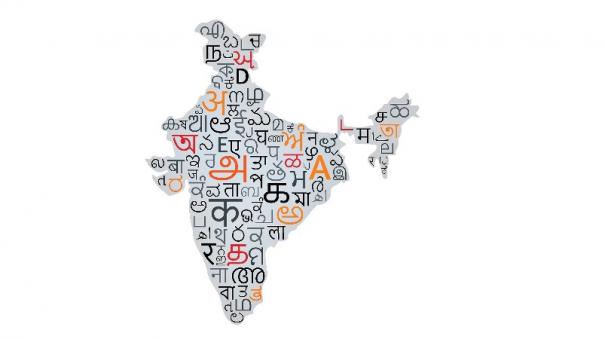Way back in 1999, the United Nations Educational, Scientific and Cultural Organisation (UNESCO) declared February 21 as the International Mother Language Day which has been celebrated every year since 2000.
At the Hindi Language Day celebration held at Surat on Sept.14, 2022, Union Home Minister Amit Shah said, “Hindi, our official language, must be learnt in order to understand the soul of our culture and history.”
Reacting to this statement, Tamil Nadu Chief Minister M. K. Stalin has in a statement said, “Historians have highlighted the fact that thousands of years before Hindi was born, the Dravidian family of languages led by Tamil and its cultural values had spread beyond the boundaries of the Indian landscape.”
Stalin’s statement is not just a response to the union minister’s assertion but also a pointer to where one must begin reading and understanding the Indian history. Historians begin their research from South India for understanding the soul of the Indian history and culture, said Stalin.
Language of soul?
The powers-that-be at the centre have long been insisting on learning Hindi as an official language in order to understand the soul of India. “Sanskrit helps understand the Indian soul,” once said Venkaiah Naidu, former Vice-President. Efforts have been made to invest Sanskrit with all glorious attributes that are said to be paving the way for modernity in intellectual pursuits ranging from mathematics to science. This is what the BJP-led union government’s new education policy is waxing eloquent about.
Right on the heels of power transfer effected in 1947 from the British to the upper sections of the Indian society, Sanskrit universities sprouted in the country. Through a law enacted in Parliament in 2020, Central Sanskrit University (Delhi), Lal Bahadur Sastri University (Delhi) and Rashtriya Sanskrit Vidya Peeth were upgraded as Deemed Universities. The lion’s share of tax-payers’ money has been spent on development of the Sanskrit Universities. Not even a quarter of the funds earmarked for the development of Sanskrit and Hindi is allotted for other languages including Tamil. Fabulous amounts are spent on intensifying efforts to establish Hindi as the strong official language of India. The recommendations on development of Hindi, made by the Parliament Committee set up during the Congress reign, were accepted by the President during the BJP rule. What kind of effects will the recommendations, if implemented, will make?
Maharashtra’s order
In an act of holding aloft its own mother tongue, Maharashtra came up with a Government Order on 05.12.2017 that made Marathi the compulsory official language in all union government offices in the state. “The union government offices in Maharashtra have not complied with the order on Marathi as the official language and we would like to enforce the rule more stringently,” Vinod Tawde, the Minister for Marathi Language said in the Assembly. He pointed this out as one of the recommendations made by the Official Language Commission set up under the chairmanship of B. G. Kher on June 7, 1955.
The students’ agitation launched against the imposition of Hindi in Tamil Nadu in 1965, inspired a sense of linguistic nationalism among other races. It is noteworthy that C.N.Annnadurai thundered in Rajya Sabha, “India’s all national languages must be made official languages of the union government. I will not rest till Tamil is made one of the u official languages of the union government.” Communist leaders like Bhupesh Gupta and other members of the Rajya Sabha welcomed Anna’s speech, indicating that other states began to understand the language-oriented national problem. The Maharashtra government’s present initiative is the action-based version of the demand that all national languages of India be made India’s official languages.
Language politics
The question arises if the state government can interfere in the union government’s powers. But we have been witnessing since 1947 how the union government has been trespassing on the power frontiers of the state governments. Way back in 1990, the union government sent a circular, asking the employees of its departments to sign in Hindi for a week. But the fact is that in the union government service, there are employees from various states also, most of whom do not know Hindi and have written their competitive exams only in English. So, they cannot carry on their work as easily in Hindi as their Hindi counterparts who have taken their exams only in Hindi. A Punjabi, for instance, cannot understand the Kannadigas’ culture in Karnataka. The people can understand their own culture and history only through their mother tongues.
Hindi or Sanskrit can by no means be India’s lingua franca. Nor can India’s overall soul be understood through Hindi. Various cultures can be understood only through the respective languages. There is a proviso in the amended Official Languages (Use for Official Purposes of the Union) Rules, 1976, which says that the union government can interact with Hindi-speaking states through Hindi and with the non-Hindi states in Hindi and English as well. Tamil Nadu can interact with the union government either through Tamil or English. But no government has till date complied with this rule. Had this amended rule been enforced, a single language imposition bid could have been avoided.
English may open up thousands of avenues of knowledge. Hindi may enter through a hundred portals in administration. But, be it the horizons of knowledge or administrative units, Maharashtra has taken up the key of mother tongue to open them, catching hold of the first rays in the process of making knowledge and power tools of the people’s welfare. So, let the amount of light being shed on Hindi and Sanskrit be shone on other languages too. Otherwise, the superiority-inferiority divide between Hindi and other languages will change into the form of an action that establishes state autonomy as a strong entity, as happened in Maharashtra.
- Translated by V.Mariappan.
- The Hindu, 28 Sep 2022



















கருத்துகள் / Comments